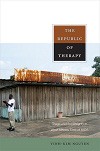
The Republic Of Therapy
Vinh-kim Nguyen
Duke University Press
$22.95
paper
238pp
9780822348740
Practicing HIV physician Vinh-Kim Nguyen’s The Republic of Therapy lays out this bleak landscape of AIDS treatment in Africa from the 1990s to the present. At once personal testimony and cultural study, Nguyen’s account reveals the unacknowledged triage system that arose with the overwhelming and insurmountable demand for treatment. Nguyen’s experiences in Burkina Faso and Côte d’Ivoire support his portrayal of AIDS relief as “political in the strongest sense, projecting the power of life or death.” His examination presents the dark side to treatment initiatives and shows how their criteria for classifying people resonate with similar examples from Africa’s colonial history.
In the 1990s, the combination antiretroviral therapy available for treatment came with a price tag of upwards of fifteen thousand dollars annually and was simply out of reach for Africans. At a time when there was a dearth of available medicine, AIDS treatment in Africa focused on therapeutic discourse. Nguyen delves into the practices and applications of support groups and shows how communal exercises coaxed people into conversation. It was at once a desperately needed practice to open dialogue (a “technology of the self,” he calls it, drawing on Foucault), and laughably insufficient.
The ultimate result of these practices was that “not all lives had the same value.” From therapeutic groups, the most open and extroverted people were elected to represent international campaigns – and thus the ability to “tell a good story” became a requisite for securing treatment. “By placing a premium on finding “real” Africans with HIV, the international community inadvertently fostered competition over public HIV testimonials,” Nguyen explains. Left behind were the taciturn, the self-effacing, and all those who could not risk admitting the truth to their families. With an in-depth historical approach, The Republic of Therapy presents an intimate portrait of what it means to be HIV positive and torn in these two competing directions.
In depicting the harsh realities of treatment programs and figurehead organizations, Nguyen draws potent parallels between AIDS triage and systems of classification in colonial Africa. He notes, “The dividing practices introduced by colonialism to better manage the population and the economy transformed arbitrary distinctions into real differences between people …”
The classifications of AIDS triage began to manifest in chilling ways, as inconsistent access to drugs became transcribed in the bodies of HIV-positive individuals. Fighting to meet the need and boost treatment numbers, some organizations dispensed partial drug cocktails of the antiretroviral therapy in a bid to medicate more patients. These individuals developed resistance to the drugs, short-circuiting their hopes for treatment as medicines became more accessible in later years. Nguyen highlights the clash between the political reasoning for these kinds of decisions and the biological realities of the disease.
Nguyen’s medical background is valuable in navigating the complex landscape presented in The Republic of Therapy. Neither activist, nor politician, nor patient, nor pharmaceutical provider, Nguyen brings a more objective perspective to the AIDS crisis, even as he gives a first- hand account and conveys his close relationships with HIV-positive patients. A telling and provocative study of AIDS treatment in Africa, The Republic of Therapy offers no prospective solutions, but highlights the complexities and power dynamics inherent in the process of intervention. mRb






0 Comments